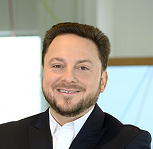Spain is undoubtedly a key country. We produce and innovate here for the whole world
Bayer is a company focused on life sciences, with over 150 years of history worldwide and over 120 years in Spain. Specialising in key areas such as health and food, it works to address some of the major challenges facing society. This duty is embedded in every step of its value chain and the areas in which it operates.
In human health, Bayer develops and produces prescription drugs in fields such as cardiology, oncology, women's healthcare and ophthalmology. It also has self-care products in this area, such as nutritional supplements, dermatological products and cold medicines. This is in addition to a plant health or agricultural division, with high-value seeds, crop protection and digitalisation as key segments.

How many years has Bayer been operating in Spain?
Bayer's presence in Spain dates back to 1899. Bayer has had an industrial fabric in the country for over 120 years, with some important production sites, as well as research and development centres and administration offices. We have a total of nine locations distributed throughout the country, being a benchmark for the whole organisation.
You have grown through acquisitions of other companies, but also through investments in new plants. How has the company evolved in Spain over the years?
Spain is undoubtedly a key country. We produce and innovate here for the whole world and for all areas of Bayer's activity, related to both health and food. This development, which has been consolidated over the years, has also occurred due to an ongoing commitment to investment. In the last five years alone, we have invested more than 263 million euros in the country, 106 million euros of which have been allocated to improving efficiency and expanding our locations, which places us in a good position for the present, but does above all prepare us for a future in which we will continue to consolidate this position and have the chance of absorbing new projects. Our global corporate strategy has also been evolving and opening up to collaboration and open innovation, adding new projects to our activity in the country. The acquisition of AskBio worldwide is an example that has enabled us to make progress in a key area such as gene therapy, and to include a new company in San Sebastian, Viralgen, which is one of the world's leading centres for gene therapy manufacturing at-scale.
In addition to production centres, you have now opened a LifeHub specialising in health and agriculture. Why did you choose Barcelona?
This is indeed another project that will enable us to move forward in science-based collaborative approaches in order to address some of the major challenges we face as a society. LifeHub Barcelona was specifically created with the aim of accompanying the acceleration of innovative projects as tools for transformation in the fields of health and agriculture, and in order to promote the culture of innovation in our communities. Barcelona is the perfect place to implement this project, as it has become the fifth largest European startup hub, with more than 1,700 organisations operating in an innovative, attractive and multicultural environment. Hosting this project at our Iberia headquarters is also an opportunity to advance corporate culture and shape collaboration and exchange with the local innovation community, be it startups, universities, technology institutions or innovation and research centres, so that we can grow, learn and evolve together.


What projects do you now have underway, and what are the upcoming challenges?
We want to be drivers of the required transformation, both within the company and in our environments, and in order to make progress in responding to the needs of people and the planet, generating a real positive impact and advancing our vision of "health and food for all". We know that there are more and more of us on the planet every year, and that we are living longer. By 2050, there will be two billion more people on earth, and one in six of them will be over 65 years old. Helping to meet the health and nutrition needs of these people is our greatest ambition, but we know that this is only possible if we make parallel progress regarding our climate goals. Bringing our innovation to Spanish people, patients, farmers, consumers and society in general, and ensuring a positive impact on the region, is what the entire Bayer team in Spain is focused on. We have a great example in our agriculture division. Our agricultural system is heavily impacted by climate change, which will reduce arable land and make the task of feeding the population a challenge. In Spain, the Mediterranean basin is becoming increasingly dry and the area affected by forest fires is growing, something which is deeply affected by depopulation. Our R&D is already helping to make crops more efficient and less dependent on natural resources, while also relying on new technologies for the digitalisation of the countryside and the implementation of pioneering projects such as carbon sequestration through agriculture. And we do all this with partnerships. In this regard, the Bayer Forward Farm we opened last year in Carmona (Seville) is a platform for research and joint learning that is unique in Spain.
Photos: Bayer



